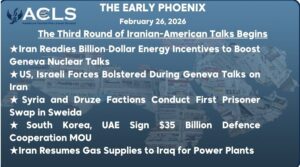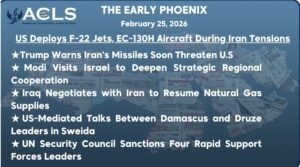By: Rania Kisar
Intense Attacks on U.S. Forces, Civilians in Idlib & Aleppo, and Continued U.N. Failed Approaches
Iran Intensifies Assaults on US Forces in Iraq and Syria
In a series of 10 daring new attacks, Iranian-backed militias, using drones and missiles, have markedly escalated hostilities against US forces. These incidents form part of a broader pattern of over 80 attacks, intensifying since Israel’s Gaza offensive in mid-October. Despite these provocations, the restraint shown by the Biden administration has led to criticism from Congressional Republicans. Senator Lindsey Graham, for instance, has called for a firmer stance against Iran’s aggressive actions.
Meanwhile, in Syria, Assad’s Prime Minister Hussein Arnous, under Assad’s regime, was recently summoned to Tehran. His visit, ostensibly for signing an economic agreement, is widely seen as a move by Iran to strengthen its influence in war-torn Syria. This development comes as the Iranian Revolutionary Guard Corps (IRGC), under increasing pressure, faces setbacks in Syria’s northeast. Following covert drone strikes in Deir ez-Zor, which targeted IRGC sites and caused significant material damage, the IRGC has repositioned their bases to civilian areas. This strategic shift, while anticipatory of further strikes, raises serious concerns about the safety of civilians in these regions.
Escalation in Idlib and Aleppo
Escalation in Idlib and Aleppo: In Syria’s northwestern regions, the conflict has intensified, particularly in Idlib and Aleppo. Recent missile strikes and bombings, tragically resulting in significant civilian casualties, including children, underscore the dire situation. In response to the Syrian regime’s lethal artillery and missile attacks on Idlib, Hay’at Tahrir Al-Sham has launched counterstrikes targeting regime positions in Latakia and Aleppo. These retaliatory strikes follow the devastating “Idlib massacre,” where regime forces killed 9 civilians and injured 33 others, further exacerbating the ongoing conflict. Civil defense teams have reported a distressingly high number of attacks this year, with a tragic toll on civilians, particularly children and women. Meanwhile, Syrian regime-affiliated media sources have acknowledged casualties in Nubl and Al-Zahraa, attributing them to the opposition’s rocket attacks.
International Tensions and Continued Failed Approaches
On the Eve of the Universal Declaration of Human Rights’ 75th Anniversary, the US and UK have intensified their stance on human rights abuses in Syria. This comes as they impose new sanctions on Syrian regime officials – 11 from the US and eight from the UK, including ministers and military officers. These sanctions, comprising travel bans and asset freezes, underscore a robust opposition to human rights violations in the region.
Meanwhile, the Russian Center for Reconciliation in Syria has accused International Coalition warplanes, such as F-15, Rafale, and A-10 fighters, of breaching deconfliction rules in the Al-Tanf region. This claim, contested by the US, who in turn alleges unprofessional Russian air maneuvers, mirrors the deeper geopolitical rift between the US and Russia in Syria.
The Syrian state news agency SANA reported that Israel launched a missile strike near Damascus, which was countered by Syria’s air defenses. Some Israeli missiles were intercepted, resulting in only material losses. The attack, originating from the Golan Heights, received no immediate response from Israel. Israel periodically conducts strikes in Syria, citing threats from Iranian-backed groups.
Further complicating matters, UN envoy Geir Pedersen, speaking at the Doha Forum, drew attention to the ongoing stagnation in resolving the Syrian crisis. He pointed out the implications of the Gaza conflict’s spillover and the deadlock in peace negotiations. Pedersen reiterated the ineffectiveness of the ‘step by step‘ approach – previously proven unsuccessful – which includes proposals like force reduction and a nationwide ceasefire, envisioned to set the stage for American withdrawal and a settlement between the Syrian Democratic Forces and the regime. Notably, Pedersen omitted any mention of the regime and Russian offenses in Idlib and Aleppo.”
===================



